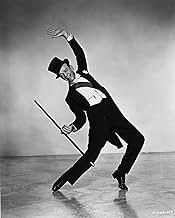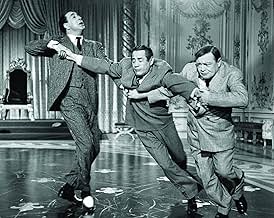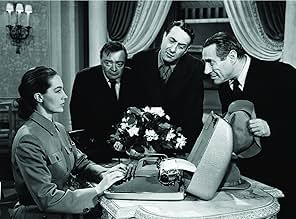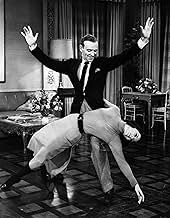VALUTAZIONE IMDb
6,8/10
4505
LA TUA VALUTAZIONE
Aggiungi una trama nella tua linguaA Russian government official is sent to Paris to bring back her comrades; she soon gets a taste of Paris life and falls in love with an American movie producer.A Russian government official is sent to Paris to bring back her comrades; she soon gets a taste of Paris life and falls in love with an American movie producer.A Russian government official is sent to Paris to bring back her comrades; she soon gets a taste of Paris life and falls in love with an American movie producer.
- Regia
- Sceneggiatura
- Star
- Premi
- 5 candidature totali
Don Anderson
- Restaurant Patron
- (non citato nei titoli originali)
Edit Angold
- Wife
- (non citato nei titoli originali)
Frank Arnold
- Soviet Guard
- (non citato nei titoli originali)
Susan Avery
- Model
- (non citato nei titoli originali)
Virginia Bates
- Model
- (non citato nei titoli originali)
Herman Belmonte
- Reporter
- (non citato nei titoli originali)
Rodney Bieber
- Dancer
- (non citato nei titoli originali)
John Bleifer
- Tenant
- (non citato nei titoli originali)
Recensioni in evidenza
A lot of humor at the expense of the Soviets (natch) is present throughout this musical version of "Ninotchka" in which Greta Garbo was the Russian who melts into a normal woman thanks to the spell of capitalism. Here it's CYD CHARISSE who plays the very uptight lady (with a stiffness that comes naturally to Cyd who could play an "ice princess" with the best of them). And FRED ASTAIRE is thankfully cast as an American film producer hoping to get her cooperation in borrowing a Soviet composer for his new film.
That's the nuts and bolts of the story, but the ingredients (including a trio of Soviet agents played by PETER LORRE, JULES MUNSHIN and Joseph BULOFF and a ditsy American singer/actress JANET PAIGE), are enough to stir up a lot of sardonic humor and some really good song and dance numbers. Paige is especially good with her "Stereophonic Sound" routine and "Satin and Silk", flirtatious and vivacious as ever in a top supporting role.
But it's the dance elements that count here--Astaire at his most elegant and Cyd Charisse gracefully matching him step by step all the way through. Her performance as the serious minded miss who gradually bends to his ways is one of her better contributions to film comedy.
Summing up: A delightful blend of Cole Porter songs and a clever script make this one a sheer pleasure, smooth as silk.
That's the nuts and bolts of the story, but the ingredients (including a trio of Soviet agents played by PETER LORRE, JULES MUNSHIN and Joseph BULOFF and a ditsy American singer/actress JANET PAIGE), are enough to stir up a lot of sardonic humor and some really good song and dance numbers. Paige is especially good with her "Stereophonic Sound" routine and "Satin and Silk", flirtatious and vivacious as ever in a top supporting role.
But it's the dance elements that count here--Astaire at his most elegant and Cyd Charisse gracefully matching him step by step all the way through. Her performance as the serious minded miss who gradually bends to his ways is one of her better contributions to film comedy.
Summing up: A delightful blend of Cole Porter songs and a clever script make this one a sheer pleasure, smooth as silk.
Astaire too old! Gimme a break. He danced with a polish that was always present. Charisse should have been grateful for his presence and I suspect that she was.
A characiture of the USSR and America of the Cold War period? Yes indeed, and it was almost as good as "One, Two, Three" in its dialogue and situation. Its sensuality as presented in its dance numbers far exceeded the 1939 version and all comers of the same subject.
I had no problem watching a 56 year old Astaire romancing a 36 year old Charisse. As a matter of fact, I found the pair quite sensuous.
I have often wondered why in the final dance scene Cyd's costume skirt was switched to a cullote in the middle of the scene. The switch was not seamless as it was very noticeable.
But, all in all I give this delightful musical a rating of 8 on a 0 to 10 scale.
Dave
A characiture of the USSR and America of the Cold War period? Yes indeed, and it was almost as good as "One, Two, Three" in its dialogue and situation. Its sensuality as presented in its dance numbers far exceeded the 1939 version and all comers of the same subject.
I had no problem watching a 56 year old Astaire romancing a 36 year old Charisse. As a matter of fact, I found the pair quite sensuous.
I have often wondered why in the final dance scene Cyd's costume skirt was switched to a cullote in the middle of the scene. The switch was not seamless as it was very noticeable.
But, all in all I give this delightful musical a rating of 8 on a 0 to 10 scale.
Dave
Like so many films produced in the mid- to late Fifties and early Sixties, when CinemaScope and other widescreen processes enhanced a production, directors and cinematographers were usually unafraid to take full advantage of the wider ratio. They weren't so concerned about how the final product would look on TV's square screens and probably didn't anticipate the visual desecration of "formatting" and "pan-and-scan" reductions. So it's nice to know that this musical, filmed when M-G-M was about to throw in the musical towel and bid an undeserved farewell to the Arthur Freed "unit," can now be enjoyed again close to its original theatrical aspect ratio on DVD.
Astaire and Charisse are a team to be treasured (so wonderful together in "The Band Wagon" a few years earlier, under Minnelli's astute guidance) and all of the others listed in this film's credits are professionals of the highest caliber. Astaire has a fun solo (with a chorus of top-hatted dancers) in the "Ritz Roll 'n' Rock" number; Cyd gets to put those legendary legs to dazzlingly opulent use in the "Red Blues" production show-stopper; and even Janis Paige gets to raunch it up in an amusing example of clever Cole Porter risking something risqué (for its day) in a song about the Empress Josephine, "commonly known as Jo"! And there's that first reel number, "Stere-oh-phonic Sound," that cleverly spoofs the contemporary moviemakers' attempts to lure people from their TV sets with widescreens, sound coming from every corner of the auditorium and eye-glazing color processes. It may not be prime Porter but it's all far-and-away more fun and enjoyable than anything we're likely to get today with the threatened revival of the movie musical with barbarians like Baz Luhrmann given the directorial reins.
Astaire and Charisse are a team to be treasured (so wonderful together in "The Band Wagon" a few years earlier, under Minnelli's astute guidance) and all of the others listed in this film's credits are professionals of the highest caliber. Astaire has a fun solo (with a chorus of top-hatted dancers) in the "Ritz Roll 'n' Rock" number; Cyd gets to put those legendary legs to dazzlingly opulent use in the "Red Blues" production show-stopper; and even Janis Paige gets to raunch it up in an amusing example of clever Cole Porter risking something risqué (for its day) in a song about the Empress Josephine, "commonly known as Jo"! And there's that first reel number, "Stere-oh-phonic Sound," that cleverly spoofs the contemporary moviemakers' attempts to lure people from their TV sets with widescreens, sound coming from every corner of the auditorium and eye-glazing color processes. It may not be prime Porter but it's all far-and-away more fun and enjoyable than anything we're likely to get today with the threatened revival of the movie musical with barbarians like Baz Luhrmann given the directorial reins.
There are a number of good things about Silk Stockings, but there also is a professional finality about the movie that makes it easier to observe than to be delighted by it. It was one of the last of the big MGM musicals coming from Arthur Freed's production unit. It was the last musical Fred Astaire made as the lead. It was the last film directed by Rouben Mamoulian. It was based on the last Broadway musical Cole Porter wrote. Silk Stockings also was used to make a statement about the excesses some thought were ruining films and music...the advent of rock and roll and the technological changes in films with wide screen and stereo sound. It even takes a crack at the fashion for ballet in many musicals. You've got to be very clever and original to successfully parody things which are already self-parodies. Silk Stockings, even with its many entertaining moments, isn't that clever.
The story is based on Ninotchka, the female Soviet commissar who comes to Paris and finds romance reluctantly...and then enthusiastically. Paris is presented as a place where decadence was never more innocent and persuasive.
One of the things that seems so odd is that, for a Fred Astaire film, Astaire spends a good deal of time doing knee drops, full-length on-the-floor sprawls and athletic dance moves that limit the sophisticated and smooth Astaire style. He was 59 when he made the picture, and this might explain the relative shortness of some of the sequences. Still, while he is assured and immensely watchable (and while he can still do wonders with a cane), three major dance productions he is in just seem choppy.
Most of the songs from the Broadway show were retained and Porter wrote a couple of new ones. It's become routine with Porter to say that whatever his latest show was, the score was never one of his best. In this case, it's true. The romantic songs are great, but the topical specialty numbers just seem tired. Siberia and The Ritz Roll and Rock in particular miss the mark, in my opinion.
Astaire, as always, is first class. Charisse is easy to look at and a fine dancer. George Tobias, as a commissar in Moscow and Ninotchka's boss, gives a sly and dead-pan performance. Some of Porter's songs are very good. Mamoulian brought the film in on time and under budget. And Silk Stockings was a success with ticket buyers.
The story is based on Ninotchka, the female Soviet commissar who comes to Paris and finds romance reluctantly...and then enthusiastically. Paris is presented as a place where decadence was never more innocent and persuasive.
One of the things that seems so odd is that, for a Fred Astaire film, Astaire spends a good deal of time doing knee drops, full-length on-the-floor sprawls and athletic dance moves that limit the sophisticated and smooth Astaire style. He was 59 when he made the picture, and this might explain the relative shortness of some of the sequences. Still, while he is assured and immensely watchable (and while he can still do wonders with a cane), three major dance productions he is in just seem choppy.
Most of the songs from the Broadway show were retained and Porter wrote a couple of new ones. It's become routine with Porter to say that whatever his latest show was, the score was never one of his best. In this case, it's true. The romantic songs are great, but the topical specialty numbers just seem tired. Siberia and The Ritz Roll and Rock in particular miss the mark, in my opinion.
Astaire, as always, is first class. Charisse is easy to look at and a fine dancer. George Tobias, as a commissar in Moscow and Ninotchka's boss, gives a sly and dead-pan performance. Some of Porter's songs are very good. Mamoulian brought the film in on time and under budget. And Silk Stockings was a success with ticket buyers.
As "Silk Stockings" reaches the half-century mark, it is now so dated that it can be enjoyed either as a period piece, as a look at popular attitudes toward the Cold War, as a rather silly but enjoyable setting for the odd couple of Cyd Charisse and Fred Astaire, or as a chance to see character actors like Jules Munchin and Peter Lorre. You know it's an old movie when Technicolor and stereophonic sound are being touted as the new big things!
Whether you like the main movie or not, the DVD extras have their own charm. The Special Features section includes a short film with Cyd Charisse as narrator, made about 2003, in which she talks about Cole Porter, Fred Astaire, and how the film came to be. Another short b/w film from the thirties is called "Paree, Paree". This one stars a very young Bob Hope, and features Cole Porter songs from the musical "20 Million Frenchmen".
Another musical treat is the "Poet and Peasant Overture", written by Franz von Suppe, played by the full studio orchestra. Both the 'Paree' film and this overture will tease you with musical strains familiar to those of us who grew up with old cartoons, so be warned! Listening to this music may induce animation flashback.
Whether you like the main movie or not, the DVD extras have their own charm. The Special Features section includes a short film with Cyd Charisse as narrator, made about 2003, in which she talks about Cole Porter, Fred Astaire, and how the film came to be. Another short b/w film from the thirties is called "Paree, Paree". This one stars a very young Bob Hope, and features Cole Porter songs from the musical "20 Million Frenchmen".
Another musical treat is the "Poet and Peasant Overture", written by Franz von Suppe, played by the full studio orchestra. Both the 'Paree' film and this overture will tease you with musical strains familiar to those of us who grew up with old cartoons, so be warned! Listening to this music may induce animation flashback.
Lo sapevi?
- QuizAfter this film, Fred Astaire effectively retired from musicals, preferring to concentrate on non-musical roles, though he would produce several musical specials for TV in the next few years. He wouldn't make another musical until Sulle ali dell'arcobaleno (1968).
- BlooperIt becomes fairly obvious during the "Fated to be Mated" duet between Fred Astaire and Cyd Charisse that Charisse is wearing a skirt one moment and culottes (or flared shorts) the next. The bottom half of her costume changes on each cut of the dance when they are doing deep knee bends, and this is where the culottes show. For the upright spins and lifts, the skirt shows. The dance was obviously performed twice and edited into one sequence.
- Citazioni
Vassili Markovitch, Commisar of Art: I want to look somebody up. Does this office have a copy of Who's Still Who?
- ConnessioniEdited into Histoire(s) du cinéma: Une histoire seule (1989)
- Colonne sonoreI've Got You Under My Skin
(1936) (uncredited)
Music by Cole Porter
Heard at the beginning as Steve and Boroff arrive at the hotel
I più visti
Accedi per valutare e creare un elenco di titoli salvati per ottenere consigli personalizzati
- How long is Silk Stockings?Powered by Alexa
Dettagli
Botteghino
- Budget
- 1.853.463 USD (previsto)
- Lordo in tutto il mondo
- 9755 USD
- Tempo di esecuzione
- 1h 57min(117 min)
- Mix di suoni
- Proporzioni
- 2.35 : 1
Contribuisci a questa pagina
Suggerisci una modifica o aggiungi i contenuti mancanti





















